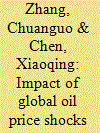|
|
|
Sort Order |
|
|
|
Items / Page
|
|
|
|
|
|
|
| Srl | Item |
| 1 |
ID:
166577


|
|
|
|
|
| Summary/Abstract |
In this paper, we analyze the relationship between energy intensity and energy price in a panel of 120 countries over 34 years, from 1980 to 2013. We use information on energy intensity and real oil price, and merge it with macroeconomic data on the countries' structural characteristics. We assess their long-run relationship and direction of causality using panel cointegration tests and dynamic panel data models. We identify a statistically significant, but weak negative effect of real oil price on energy intensity, which corresponds to a positive effect of energy price on energy efficiency. We also show significant, large regional differences in this relationship. We thus posit that a global policy aimed at increasing the price of oil would induce a limited increase in average energy efficiency through a more efficient use of energy, but this increase would differ considerably across regions around the world.
|
|
|
|
|
|
|
|
|
|
|
|
|
|
|
|
| 2 |
ID:
166574


|
|
|
|
|
| Summary/Abstract |
This paper evaluates the macroeconomic implications of energy price volatility through the lens of a dynamic stochastic general equilibrium (DSGE) model in an open economy. The model develops a small open economy in which households consume energy products and firms use energy as productivity inputs, where the country is so small that it needs to import energy, the price of which is determined abroad. Whereas positive energy price shocks cause an economic slowdown due to higher costs for consumers and firms, energy price volatility shocks generate an increase in GDP in the short-run and a reversal in the long-run. These findings are empirically supported by estimates from a Panel VAR model applied to 10 Asian economies, where energy price volatility has a positive impact on GDP in the short-run. Moreover, the paper finds that increasing demand or supply uncertainty also affect energy prices, with amplified fluctuations relative to a model that abstracts from energy. Market volatility leads households to cut consumption for precautionary savings motives, which in turn increases investment.
|
|
|
|
|
|
|
|
|
|
|
|
|
|
|
|
| 3 |
ID:
150793


|
|
|
|
|
| Summary/Abstract |
Enhancing energy technology innovation performance, which is widely measured by energy technology patents through energy technology research and development (R&D) activities, is a fundamental way to implement energy conservation and emission abatement. This study analyzes the effects of R&D investment activities, economic growth, and energy price on energy technology patents in 30 provinces of China over the period 1999–2013. Several unit root tests indicate that all the above variables are generated by panel unit root processes, and a panel cointegration model is confirmed among the variables. In order to ensure the consistency of the estimators, the Fully-Modified OLS (FMOLS) method is adopted, and the results indicate that R&D investment activities and economic growth have positive effects on energy technology patents while energy price has a negative effect. However, the panel error correction models indicate that the cointegration relationship helps to promote economic growth, but it reduces R&D investment and energy price in the short term. Therefore, market-oriented measures including financial support and technical transformation policies for the development of low-carbon energy technologies, an effective energy price mechanism, especially the targeted fossil-fuel subsidies and their die away mode are vital in promoting China's energy technology innovation.
|
|
|
|
|
|
|
|
|
|
|
|
|
|
|
|
| 4 |
ID:
127868


|
|
|
|
|
| Publication |
2014.
|
| Summary/Abstract |
This paper investigated the reaction of aggregate commodity market to oil price shocks and also explored the effects of oil price shocks on China's fundamental industries: metals, petrochemicals, grains and oilfats. We separated the volatilities of oil price into expected, unexpected and negatively expected categories to identify how oil prices influence bulk commodity markets. We contrasted the results between different periods and among classified indices, in order to discover the significant changes in recent years and the differences at an industry level. Our results indicate that the aggregate commodity market was affected by both expected and unexpected oil price volatilities in China. The impact of unexpected oil price volatilities became more complex after 2007. The metals and grains indices did not significantly respond to the expected volatility in oil prices, in contrast to the petrochemicals and oilfats indices. These results not only contribute to advancing the existing literature, but also merit particular attention from policy makers and market investors in China.
|
|
|
|
|
|
|
|
|
|
|
|
|
|
|
|
| 5 |
ID:
125713


|
|
|
|
|
| Publication |
2013.
|
| Summary/Abstract |
Planning of national energy policies brings new dilemmas with the introduction of distributed generators (DG). Economic theory suggests that a perfectly competitive market would lead to efficient pricing. In the absence of competition, regulators play a fundamental role in attracting reasonably priced finance in order to maintain, refurbish and increase the infrastructure and provide services at a reasonable cost. Energy market price equilibrium is mainly dependent on suppliers, generators, energy sources and demand, represented by conventional utility grid users. Its behavior is similar to that of other commodities. As generation becomes less centralized with the increasing economic viability of renewable energy sources, new suppliers are being connected to the grid. Such evolution means the transition from a monopolistic market to a broader and more open environment, with an increasing number of competitors. We make use of variational inequalities to model a hypothetical DG market in different scenarios, from monopoly, to oligopoly, to open market. Such an approach enables different equilibrium outcomes due to different DG penetration levels. Based on these findings, we argue that energy policies for such markets must be developed according to each specific stage of the grid's lifecycle. We show how energy policies and market regulations may affect such a transition, which may be catastrophic if not managed properly, and which is dependent on the energy mix.
|
|
|
|
|
|
|
|
|
|
|
|
|
|
|
|
| 6 |
ID:
176668


|
|
|
|
|
| Summary/Abstract |
As part of ‘Vision 2030’, Saudi Arabia has initiated a broad-based energy reform programme aimed at gradually reducing its dependence on oil. This paper assesses the impacts of energy price reforms on living expenses of various household groups in Saudi Arabia. For this purpose, the input-output table combined with household expenditure data are used to model the impacts. Results show that the distributional impacts of energy price reforms are regressive, with low-income households experiencing a higher increase in living expenses compared to high-income households. The impacts are primarily instigated by rising prices of energy-intensive products. After decomposing the impacts into direct and indirect effects, it was found that indirect effect is not only responsible for a considerable rise in household expenditure on energy-intensive products, but it is also distributionally regressive. It is therefore vital for policymakers to review and fine-tune the social protection system to protect poor households against reforms.
|
|
|
|
|
|
|
|
|
|
|
|
|
|
|
|
| 7 |
ID:
093486


|
|
|
|
|
| Publication |
2010.
|
| Summary/Abstract |
The pricing mechanism for energy is not in line with the international standards, because the energy prices are controlled by the government partly or completely in China. Chinese government made a lot of efforts to improve the pricing mechanism for energy. The relations between Chinese energy prices and energy consumption are the foundations to reform the mechanism. In this paper, the relations between Chinese energy consumption and energy prices are researched by cointegration equations, impulse response functions, granger causality and variance decomposition. The cointegration relations among energy prices, energy consumption and economic outputs show that higher energy price will decrease energy consumption in Chinese industrial sectors but will not reduce the economic output in the long run. The cointegration relation between energy price and household energy consumption shows that higher energy price will decrease household energy consumption in the long run and increase it in the short run. So Chinese government should deepen the reform of pricing mechanism for energy, and increase the energy prices reasonably to save energy.
|
|
|
|
|
|
|
|
|
|
|
|
|
|
|
|
| 8 |
ID:
116961


|
|
|
|
|
| Publication |
2012.
|
| Summary/Abstract |
We employ decomposition analysis and econometric analysis to investigate the driving forces behind China's changing energy intensity using a provincial-level panel data set for the period from 1995 to 2009. The decomposition analysis indicates that: (a) all of the provinces except for a few experienced efficiency improvement, while around three-fourths of the provinces' economics became more energy intensive or remained unchanged; (b) consequently the efficiency improvement accounts for more than 90% of China's energy intensity change as opposed to the economic structural change.
The econometric analysis shows that the rising income plays a significant role in the reduction of energy intensity while the effect of energy price is relatively limited. The result may reflect the urgency of deregulating the price and establishing a market-oriented pricing system in China's energy sector. The implementation of the energy intensity reduction policies in the Eleventh Five-Year Plan (FYP) has helped reverse the increasing trend of energy intensity since 2002. Although the Chinese Government intended to change the industry-led economic growth pattern, it seems that most of the policy effects flow through the efficiency improvement as opposed to the economic structure adjustment. More fundamental changes to the economic structure are needed to achieve more sustainable progress in energy intensity reduction.
|
|
|
|
|
|
|
|
|
|
|
|
|
|
|
|
|
|
|
|
|